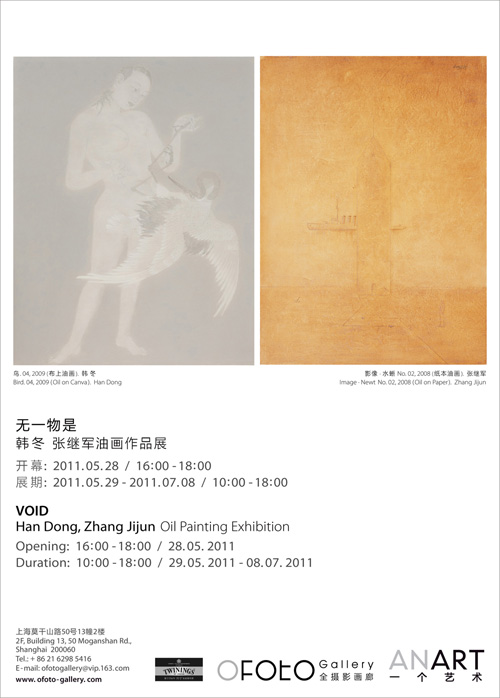- VOID
- Artist: Han Dong, Zhang Jijun
- Critic: -
- Opening: 16:00 / 28.05.2011
- Duration: 10:00 - 18:00 / 29.05.2011 - 05.09.2011
- Address: ANART. 2F, Bldg.13, 50 Moganshan Rd., Shanghai, China

Han Dong:
Han Dong's works stylizes in homochromous and elegant tones, almost flat spaces and details. The main theme of expressing what the artist thinks about life is being the use of female characters. In Han Dong's works, woman looks not so feminine but symbolic. In other words, woman has become a carrier of certain abstract meaning. In his works of the 90s, textures are slightly rough. With plain background, people tend to be stiff and their gestures are extremely simple. The picture always appears simple, unsophisticated and heavy, thus constructs his personal style. If the details of the 90s' works depend on the whole composition and lonely images caused after spreading a figure group's easy shape, the figures depart from solitude since year 2000. Although the figures haven't been concentrated on a focus, the background, people's posture, face look and tone have all changed. The classic keynote is still strictly maintained. That invariable female group seems to carry more vitality compared with that of 1990s as if they were goddess stepping into the world from easel. Suddenly endowed with a few common customs, there is no emptiness and melancholy of 1990s between women's facial features. Although it adds a layer of soft and transparent mist during this period, the whole image takes in more breath of life. In Han Dong's latest series "Bird", the tone of the painting is simpler than before and the background has nothing but a monochromatic hue. Here the women figures have been reduced from a few to only one, who maintains an extreme classical elegance. The whole piece has turned into almost purely classical. Unlike the previous works, the content barely touches contemporary; for example, "Deer and Girl"(2005). However, the four paintings are constantly repeating the same motion. The composition guides the audience eyes to the postures of girl and crane. In such repetitions, a subtle act breaks the balance of the whole painting. The posture of the girl grasping the crane is, on the one hand, very elegant but on the other hand, dissolves all the classical elegance that has been painstakingly built up. Moreover, there is no typically stylized expression in the girl's eyes, yet it flexibly conveys a certain emotion. Will the whole tranquil classic, just like the title "Fading Bird", in this fleeting post-modern society, be fading away or desperately struggling like the crane?
Extracted from Gu Chengfeng "Let Us Dream in The Light of Day"
Translated by Fan Chen
Zhang Jijun:
Let Us Dream in The Light of Day
Gu Chengfeng
Just like how artists come in different types, their works have unique dispositions-some works provoke deep thought with their sheer brilliance; some reveal bright minds at work; some are teasing and entirely unserious; and then there are those which bring us to the realm of dreams.
It seems that Zhang Jijun's works are of the last type. His oil paintings carry us far away from the troubles of everyday life to a different place, and yet neither is this world heaven. Here, toy-like maces and iron horses are dashing, and kites are floating elusively in the air. Boulevards are extending into the horizon, straight and hazardous; cold, solemn walls of crimson are standing erect in greeting. The wisps of clouds on the sky are comforting yet elusive; the figurines on the ground, hazy and mysterious.
Even those seemingly realistic brick walls evoke a surreal impression: a solitary building, dusty with age, stands compact yet forlorn in the field, its rust-colored form juxtaposed starkly against a background of cold colors. Yet just when our imagination is about to take off, the painter halts his brush, leaving us with a certain disquiet of the mind, a certain silence in the presence of that which exists and that which meets our gaze.
Seeing Zhang's art is like sipping a rich cup of tea, with an initial slight bitterness lingering about the tongue, which is soon taken over by a soft fragrance. And perhaps then, our gaze will take to the window and to the far horizon in the distance.
Who doesn't hope for a certain transcendence? Dreams provide us with wings, though the flight is not always without turbulence. Yet to be able to dream in the light of day is truly a blessing of a kind.
The American philosopher John Dewey has said: in an imperfect society-and no society will ever be perfect-fine art will be to some extent an escape from, or an adventitious decoration of, the main activities of living.
Yet, perhaps escape can be relished, and daily life made rich by decoration.
Standing before Zhang Jijun's works, do you have dreams?


